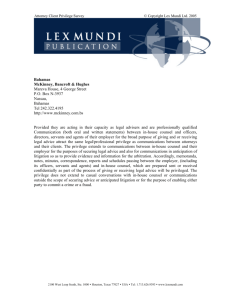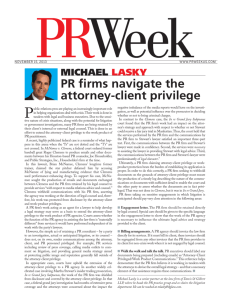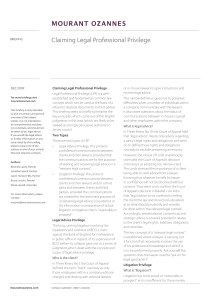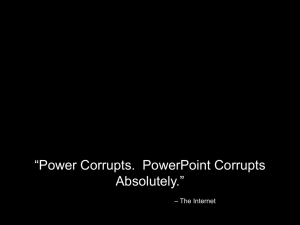Presentation Slides
advertisement
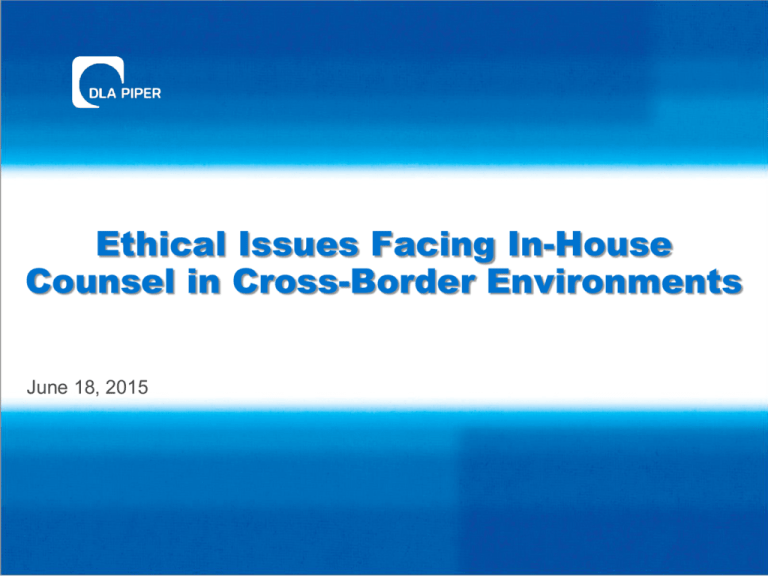
Ethical Issues Facing In-House Counsel in Cross-Border Environments June 18, 2015 Who we are Presenters: Karl Dial Eli Burris Casey Moore 3 Attorney-Client Privilege Privilege in the United States Privileges exist to encourage the disclosure of information without fear that it will be used against you unfairly Two primary privileges Attorney-client privilege Work product 5 Privilege in the United States Attorney-Client Privilege Oldest privilege for confidential communications known to the common law Key elements: Communication Where a primary purpose of the communication is in furtherance of legal advice of assistance Expectation of confidentiality with confidentiality preserved. Client holds the privilege Somewhere between “mere presence” of legal issue and “sole purpose”: The mere presence of a legal issue relating to the communication is insufficient to render the communication privileged, but legal advice also does not have to be the sole purpose of the communication 6 Work Product Doctrine PROTECTS PROTECTS DISCLOSURE OF MATERIALS LAWYER’S WORK PREPARED BY AND MENTAL CLIENT AT LAWYER’S IMPRESSIONS IN DIRECTION ANTICIPATION OF LITIGATION WORK PRODUCT DOCTRINE CAN PROTECT INTERNAL INVESTIGATIONS PROTECTS DISCUSSION WITH CERTAIN AGENTS, SUCH AS EXPERTS, ACCOUNTANTS, ETC. IN CERTAIN CIRCUMSTANCES 7 Work Product Doctrine Work Product Doctrine Broader protection than attorney-client privilege, but more easily pierced Protects documents prepared in “anticipation of litigation” Protects the mental processes of the attorney Was the document prepared or obtained because of the prospect of litigation by or for a party, or by or for the party’s representative? Beware: Courts will determine when litigation reasonably could have been anticipated Often that date triggers the obligation to institute a legal hold 8 Attorney-Client Privilege Around the World Attorney-client privilege for outside and in-house counsel No attorney-client privilege for in-house counsel No or very limited attorney-client privilege 9 Attorney-Client: EU All member states in the EU recognize some form of attorneyclient privilege, but more often Legal Professional Privilege (“LPP”) Belgium, Cyprus, Greece, Ireland, Malta, Netherlands, Norway, Portugal and the UK are the only specific EU jurisdictions where in-house counsel is routinely protected 10 • Communications with in-house counsel are protected; • Obligation of professional secrecy protects all legal correspondence between client and lawyer • Communications with in-house counsel are not protected Germany • Wide protection: legal advice privilege and litigation privilege France England & Wales Select EU Member States • German qualified lawyers have a professional secrecy obligation in litigation, arbitration and regulatory investigations • Communications with in-house counsel are not protected 11 China and Japan China No privilege under the laws of the PRC. There is no attorney work-product protection and there is no protection of communications between lawyers and clients on the basis of legal professional privilege in China Japan Confidentiality is a basic obligation of lawyers Lawyers may refuse to answer questions or produce documents the lawyer come to know or possess in the course of the work for the client. Concept applies to in-house counsel U.S. courts frequently recognize the privilege 12 Choice of Law US courts apply the “touch base” test If a communication originates in a foreign country and attachment of the privilege depends on the laws of that country, the foreign country’s law applies If communications “touch base” with the United States, U.S. privilege law applies Touch base test: Courts consider several factors in determining whether communications that touch base with the United States are protected by the attorney-client privilege One critical factor is that the privilege has been claimed and not waived Willemijn Houdstermaatschaapij Bv v. Apollo Computer, Inc., 707 F. Supp.1429, 1448 (D. Del. 1989). 13 International Discovery Issues International Discovery for U.S. Litigation . . . Consider: U.S. document preservation rules v. EU data protection rules Challenges of cross border discovery French Blocking Statute / Hague Convention How they affect evidence gathering for U.S. litigation Practical suggestions for collecting, reviewing and disclosing EU data in U.S. litigation Discovery includes all manner of electronically stored information (“ESI”) 15 International Discovery for U.S. Litigation U.S. litigants may request data that exists outside the U.S. U.S. courts frequently order discovery of information located outside the U.S. Disclosure may be prohibited by the laws of another country Need to understand implication of non-U.S. Data protection laws, employment law, privacy rights, blocking statutes and international treaties Can place a multi-national organization “between a rock and a hard place” 16 What about the Cloud? Answer: No single answer—continues to change In cloud, data locations are not necessarily known; servers may be in many locations Data are often in many places simultaneously; many countries may claim their laws apply Older agreements may be obsolete 17 Discovery for U.S. Litigation Involving EU Data In 1995, the European Parliament passed Directive 95/46/EC on the Protection of Individuals with Regard to the Processing of Personal Data and on the Free Movement of Such Data (the “Directive” or the “Privacy Directive”). In 2012, the General Data Protection Regulation was proposed, taking into consideration globalization and cloud computing (to be adopted in 2015–2016) Also applies to organizations based outside the EU if they process personal data of EU residents 18 Proposed Solutions: The Sedona Conference® Sedona Conference Three-prong approach: Provide safeguards to protected data by stipulations and court orders Permit a reasonable timetable to ensure adequate processing and transfer of protected data, and Establish a reasonable methodology to be applied for the processing and transfer of protected data The Sedona Conference® Framework for Analysis of Cross-Border Discovery Conflicts (2008) (available at www.thesedonaconference.org) Sedona Conference: International Principles on Discovery, Disclosure & Data Protection: Best Practices, Recommendations & Principles for Addressing the Preservation Discovery of Protected Data in U.S. Litigation (EU Edition) (12/2011) 19 Recent International Discovery News Vera v. Republic of Cuba Spanish bank ordered to inquire about account information for “all branches, within and without New York State,” Relevant to a third-party’s execution on judgments against the Republic of Cuba Court held that registering with/obtaining license from New York Department of Financial Services = consent to general jurisdiction in New York However, it may be the exception for a New York branch of a foreign financial institution to have direct electronic access to overseas account information DLA Piper Insights 29 APR 2015 https://www.dlapiper.com/en/us/insights/publications/2015/04/new-york-court-orders-worldwide-discovery/ Vera v. Republic of Cuba, 40 F. Supp. 3d 367, 369 (S.D.N.Y. 2014) 20 Proactive Steps: Pre-Litigation Broad policy addressing employee privacy expectations— such as: Work e-mail may be subject to preservation/collection in litigation Personal communications prohibited on work e-mail Access to personal email prohibited on work computer Document retention policies limiting time for retaining ESI Limit access to certain foreign data not needed by U.S. entities Coordination between EU employees handling privacy obligations and legal department overseeing U.S. litigation 21 Internal Investigations Why an internal investigation? Fiduciary duty to monitor and correct criminal misconduct Avoid indictments or reduce sanctions Government views of internal investigations as cooperation May be required (e.g., Sarbanes-Oxley Act) Compliance function Obtain facts for threatened litigation Independent internal investigations may be more successful 23 What to Do – Possibility of Impropriety Primary duty – make a reasonable inquiry to determine if a credible basis for the allegation exists Begin by talking with the whistleblower (if known) Notify internal auditor, outside auditor, CEO, audit committee Does the investigation have a valid purpose (not politics) Decide whether to use in-house or outside counsel to investigate If committee formed – remind members that they may retain their own counsel 24 Texas Rules of Professional Conduct 1.06 – Conflict of Interest – cannot be “materially and directly adverse” to a client if it involves a “substantially related matter” OR if it reasonably appears representation will be “adversely limited” 1.12 – Organization as Client – represent the entity Must take “reasonable remedial actions” when a person associated with the organization has violated legal obligation to the organization 4.01 – Truthfulness in Statements to Others – No false statement or fail to disclose material fact 4.03 – Dealing with Unrepresented Persons – Lawyer shall not state/imply that he/she is disinterested SEC Rule 205.3(a) – Lawyer owes duty to organization Advising D&O’s/employees in course of representing issuer does not make them clients 25 “Upjohn Warning” (“Corporate Miranda Warning”) Attorney represents the company, not any employee The A-C privilege applies to the interviews and the company reserves the right to decide what to reveal The fact that the conversation is privileged does not mean that what was said/done is protected The company wants the employee to keep the interview confidential • Except not from regulators/SEC 26 27 Common Employee Questions Be Prepared to Answer these common questions: 1. What are the consequences if I do not participate? 2. Can I have another employee/union rep attend? 3. Do I need my own lawyer? 4. Where can I find a lawyer? 5. Can I have time to find a lawyer? 6. Will the company pay for my lawyer? Sarah Helene Duggin, Internal Corporate Investigations: Legal Ethics, Professionalism and the Employee Interview, 2003 COLUM. BUS. L. REV. 859 (2003). 28 Maintaining Privilege in Investigations Upjohn – employee questionnaires sent to counsel + notes of contents were attorney-client privileged KBR/Halliburton – investigator’s interviews with employees & report to counsel: DC Cir.: privilege applies if a significant purpose of investigation was to obtain legal advice Dist. Ct. on remand: Investigator’s factual summaries are not attorney-client privileged Work product: Rule 26(b) allows discovery of “fact” work product if “substantial need” shown Ordered substantial portions of the report produced Upjohn Co v. United States 449 US 383, 397 (1981); In re Kellogg Brown & Root, Inc., 756 F.3d 754 (DC Cir. 2014); United States ex rel. Barko v. Halliburton Co., 2014 WL 7212881 (D.D.C. 2014). 29 Internal Investigations: Ethical Issues General Motors ignition investigation: Facing potential litigation, GM hired an outside law firm to investigate and make a report Court: sole purpose of report was to provide legal advice Relying on Upjohn, subject to attorney-client privilege What this means Counsel conducting investigation can better maintain attorney-client privilege Try to avoid work product discovery In Re: General Motors LLC, 14-MD-2543 (JMF), NYLJ 1202715543917, at *1 (SDNY, Decided January 15, 2015) 30 No Agreements To Preclude Disclosure to Regulators KBR (April 1, 2015) – SEC’s 1st enforcement action for confidentiality agreements that could stifle whistleblowing process Required employees to sign confidentiality agreements prohibiting communications with outside parties KBR agreed to pay $130,000 to settle the whistleblower protection case Andrew Ceresney, the SEC's enforcement director, said the agreements "potentially discouraged employees from reporting securities violations…” http://www.sec.gov/news/pressrelease/2015-54.html 31 Merci, Gratzie, Danke, Gracias, Cпacuьa, Thank You! 32 DLA Piper Team Karl Dial karl.dial@dlapiper.com T +1 214 743 4555 Experienced trial lawyer and CPA with 45 trials of complex commercial cases over 30+ years. Focuses on bet-the-company business litigation, trade secret claims, securities and director/officer litigation, class actions, and professional malpractice. www.dlapiper.com/karl_dial Eli Burriss Eli.Burriss@dlapiper.com T +1 214 743 4514 Has participated in representation of numerous national and international companies, both as plaintiff and defendant, in a diverse array of litigation matters. Advised a major pharmaceutical manufacturer on products in international markets. www.dlapiper.com/eli_burriss Casey Moore Casey.Moore@dlapiper.com T +1 214 743 4556 Has represented national and international clients in industries including securities, financial services, oil and gas, health care, insurance, pharmaceuticals and medical devices. Experience litigating in federal and state court and before arbitration panels, including FINRA and AAA. www.dlapiper.com/casey_moore 33
